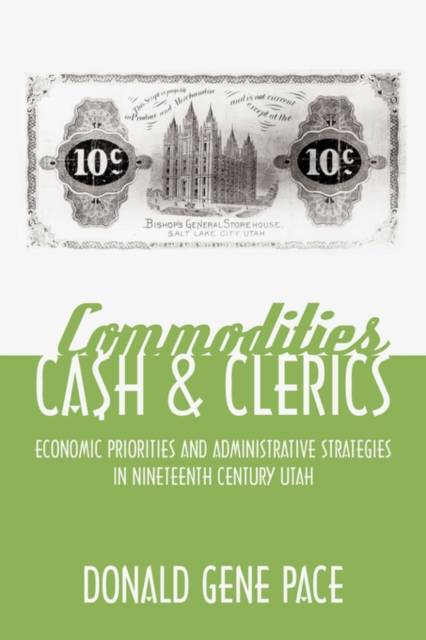
- Retrait gratuit dans votre magasin Club
- 7.000.000 titres dans notre catalogue
- Payer en toute sécurité
- Toujours un magasin près de chez vous
- Retrait gratuit dans votre magasin Club
- 7.000.0000 titres dans notre catalogue
- Payer en toute sécurité
- Toujours un magasin près de chez vous
Commodities, Cash, and Clerics
Economic Priorities and Administrative Strategies in Nineteenth Century Utah
Donald Gene Pace
Livre broché | Anglais
23,95 €
+ 47 points
Description
The massive movement of pioneer migrants into the Great American West has long captured the attention of writers. As with immigration to America generally, the prime motive for trans-Atlantic uprooting and settlement was economic. Yet there are major exceptions, such as John Winthrop's Puritans, whose city-on-a-hill motives were largely other-worldly. So it was with the great Mormon migration that resulted in the unlikely confluence of desert and Saints in the Great Basin. These members of The Church of Jesus Christ of Latter-day Saints, imbued with the religious zeal needed to reenact the Hebrew exodus on an American stage, had been the victims of intolerance and bigotry. Their momentous spiritual odyssey in the West required economic diligence to achieve. Their economy was in many ways typical of that of other areas; cash was used, but commodities were also a major means of exchange. Yet there was a major difference, a practice seen nowhere else in America on the scale to which it emerged in Utah. For numerous Latter-day Saints, the first and foremost religious duty, and economic priority, was to give away one-tenth of their increase to the Church. Payment of the religious tithe became both common and extensive, so much so that the management of commodities became a major concern. This area of public resource management not only had religious implications, but also economic and social welfare consequences. As settlements expanded, tithing donations likewise grew, and an accompanying network of bishops proliferated to manage the tithing resources at the local, regional, and central levels. It is on these leaders, these ecclesiastical managers of donated resources that could melt, rot, make noise, and even run away, that this book focuses.
Spécifications
Parties prenantes
- Auteur(s) :
- Editeur:
Contenu
- Nombre de pages :
- 104
- Langue:
- Anglais
Caractéristiques
- EAN:
- 9781449017712
- Date de parution :
- 25-08-09
- Format:
- Livre broché
- Format numérique:
- Trade paperback (VS)
- Dimensions :
- 152 mm x 229 mm
- Poids :
- 163 g

Les avis
Nous publions uniquement les avis qui respectent les conditions requises. Consultez nos conditions pour les avis.






